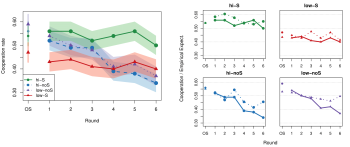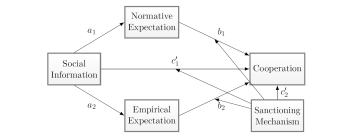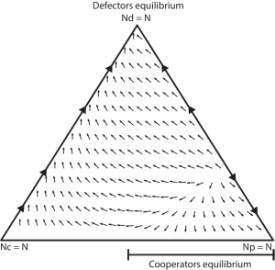Theme C: Social Norms
![]()
In this part of the project, we study how social norms interact with the natural environment to foster cooperation that overcomes common-pool dilemmas.
Project 1: The Creation of Social Norms under Weak Institutions
Authors: Florian Diekert, Tillmann Eymess, Joseph Luomba, Israel Waichman

Abstract: Formal regulations often fail to ensure sustainable management of natural resources. An alternative approach could rely on the interaction of norm-based interventions and social sanctions. Our lab-in-the-field experiment with fishermen at Lake Victoria studies how a norm-based intervention, namely social information about high or low levels of previous cooperation, affects behavior and beliefs in a prisoner's dilemma game with/without weak social sanctioning. Providing different social information succeeds in creating different norms of cooperation, but only if sanctioning is possible: Cooperation rates start at a high level and stay at a high level when social information emphasizes cooperation, but start at a low level and stay at a low level when social information emphasizes defection. Without social sanctioning, cooperation rates decline, irrespective of the social information. Particularly participants with close connection to others in their experimental session conform to the behavior that is emphasized by the social information message under sanctioning.
Status: Forthcoming in JAERE - Link![]()
Project 2: Dissecting Social Norms of Cooperation
Author: Tillmann Eymess

Abstract: As social norms are notoriously difficult to operationalize, there is limited evidence for the underlying behavioral mechanisms when interventions try to leverage them. So far, the experimental literature has used mediation analyses to identify the causal processes that link the use of so-called ``norm-nudges" to a behavioral change. However, other methodologies are needed to identify whether the effectiveness of norm-nudges depends on conditional channels such as characteristics of the participant or additional treatments. To further the understanding of norm-nudges, I utilize a conditional process analysis and showcase how to dissect the underlying behavioral mechanism not only into causal but also into conditional processes.
Status: Current draft of manuscript available on request: Write to tillmann.eymess@awi.uni-heidelberg.de
Project 3: Changing Collective Action
Authors: Florian Diekert and Tillmann Eymess

Abstract: We test whether a descriptive norm-nudge increases cooperation when decisions are taken by teams, not individuals. Because team decision making is pervasive in the economy, it is important to learn whether norm-nudges can work with teams in social dilemma situations, especially when formal enforcement of policies is difficult. Each team in our experiment comes from a different fishing firm at Lake Victoria, Tanzania. The provision of the norm-nudge is randomized across two decision making mechanisms, enabling us to identify experience with egalitarian or hierarchical management structures, both naturally present at Lake Victoria. The descriptive norm-nudge increases cooperation by 14 and 16 percentage points for egalitarian and hierarchical team decisions, respectively. Owners of hierarchical firms are particularly responsive.
Status: Current draft of manuscript available on request: Write to tillmann.eymess@awi.uni-heidelberg.de
Project 4: Overcapitalization and social norms of cooperation in a small-scale fishery
Authors: Robbert Schaap, Andries Richter

Abstract: The increasing technological efficiency of harvesting equipment has been identified as one of the main causes of overcapacity and overexploitation of natural resources. In this paper, a formal model is developed which studies the effects of technological efficiency as an endogenous variable within a bioeconomic system. We model capital investments in a fishery, where investment decisions are made less frequently than the allocation of variable inputs. We study how the possibility to invest in capital affects open access dynamics, and also the evolution of cooperative harvesting norms. We find that the possibility to make large capital investments can destabilize cooperation, especially if enforcement capacity is low. Further, we find that communities can preserve cooperation by agreeing on a resource level that is lower than socially-optimal. This reduces the incentive to deviate from the cooperative strategy and invest in capital.
Status: Published in Ecological Economics, vol. 166 - Link![]()


